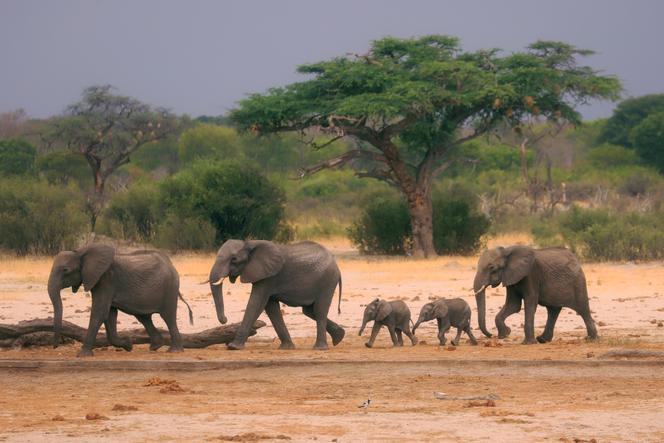
Eating elephants? “To me, it makes no sense. Personally, I’ve never eaten any, and I’ve never heard of it. It would be like eating a lion…” Bekezela Maplanka, the opposition leader in the Bulilima district, is on the front lines of dealing with the impacts of the drought affecting this rural area in southwestern Zimbabwe.
Here, the season’s harvests have been wiped out by the lack of rain, and livestock are dropping like flies as the El Niño phenomenon, which is affecting parts of southern Africa, accentuates the effects of climate change. “People are hungry,” continued the unsuccessful candidate in the 2023 elections. Yet she makes no secret of her astonishment at the solution put forward by the government to address the situation: slaughter 200 elephants and distribute their meat to the most vulnerable populations.
Zimbabwe finds itself at a loss with its elephants. While the savanna elephant population has declined by 60% across Africa over the past fifty years, Zimbabwe’s population has nearly doubled since the 1980s, rising from 50,000 to almost 100,000, according to ZimParks, the country’s wildlife protection and management authority. Recognized for its efforts in conservation, the country has long asserted that it no longer has the capacity to accommodate all these animals.
“Indeed Zimbabwe has more elephants than we need, more elephants than our forestry can accommodate,” reiterated Sithembiso Nyoni, the Minister of Environment, before Parliament on September 11. She went on to suggest looking to Namibia, which recently announced the culling of 700 wild animals, including 83 elephants, to relieve the population facing an unprecedented drought in a century.
‘Risk of reviving poaching’
This direction was quickly confirmed by ZimParks, sparking outrage among many wildlife conservation organizations. “This decision risks reigniting poaching and the illegal ivory trade, undermining the remarkable progress made in wildlife conservation,” said Tennyson Williams, Africa director of the NGO World Animal Protection, in a statement.
“This is a false solution, we have six to seven million people who need food aid, 200 elephants won’t change anything. We argue that the decision is unsustainable and does very little to address the drought effects or the conservation cause,” agreed Farai Maguwu, Executive Director at the Centre for Natural Resource Governance, a Zimbabwean association promoting responsible natural resource management, who questions the government’s motives.
You have 56.49% of this article left to read. The rest is for subscribers only.